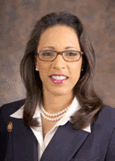Heart of the Primaries, Democrats-Issue 8 (March 5, 2018)

This week: All eyes turn to the Texas primaries, but there were big developments in Illinois, Michigan, and New Hampshire, too. Want more primary coverage? Click here to follow the latest in the Republican contests. Have a tip or see something we missed? Email us at editor@ballotpedia.org. And please share this newsletter with your colleagues!
- Upcoming filing deadlines: March 6 (Oregon), March 9 (California, Georgia, Idaho)
- Passed filing deadlines: 12
- Upcoming elections: March 6 (Texas), March 20 (Illinois)
- Declared U.S. Senate and U.S. House candidates: 1,209 Democrats, 880 Republicans
Democratic pundits on the news
Where do Democratic and progressive pundits disagree? Each week in Heart of the Primaries, we bring you excerpts highlighting differing views.
“The DCCC has lost touch with its base. Despite facing continued losses, they have yet to realize that the path to the majority requires supporting diverse candidates who hold progressive values. The majority of Democrats, and many independent voters, support Medicare for All and banning assault rifles.” - Nina Turner, president of Our Revolution, The Hill, March 4, 2018
“The bottom line is that there’s really no evidence Democrats nationally are suffering from too many primaries or too much infighting. And in California specifically, the Top Two problem for Democrats seems limited to two House districts, and in those it’s totally unclear whether the problem will actually arise.” - Ed Kilgore, New York Magazine, March 1, 2018
U.S. Congress
U.S. House
- Democratic seats heading into November: 193
- Republican seats heading into November: 238
- Open seats: 51
- Open seats currently held by a Democrat: 16
- Open seats currently held by a Republican: 35
- Seats with a Republican incumbent carried by Clinton: 23
- Seats with a Democratic incumbent carried by Trump: 12
U.S. Senate
- Democratic seats heading into November: 49*
- Republican seats heading into November: 51
- Open seats: 3
- Open seats currently held by a Democrat: 0
- Open seats currently held by a Republican: 3
- Seats with a Republican incumbent carried by Clinton: 1
- Seats with a Democratic incumbent carried by Trump: 10
Moser gets Our Revolution endorsement in TX-07, fundraising increases after DCCC attack
The Bernie Sanders-affiliated group Our Revolution endorsed former journalist Laura Moser (D) in Texas’ 7th Congressional District. The endorsement came a week after the Democratic Congressional Campaign Committee (DCCC) released opposition research against her, including an article Moser wrote expressing her desire to avoid living in rural Texas.
Our Revolution board member Jim Hightower said the DCCC’s attack on Moser was “ridiculous,” and is “why Democrats nationally have lost over 1,100 seats.”
“Laura is a rising progressive advocate that the workaday people of Texas desperately need,” Hightower said.
DCCC communications director Meredith Kelly said that Moser’s “disgust for life in Texas disqualifies her as a general election candidate.”
In the four days following the DCCC opposition release, Moser raised nearly $90,000.
Pelosi endorses Lipinski in IL-03, DCCC stays silent
House Minority Leader Nancy Pelosi (D) endorsed incumbent Rep. and Blue Dog Coalition member Daniel Lipinski (D) for Illinois' 3rd Congressional District Thursday. But the DCCC has declined to endorse any candidate in the primary.
Lipinski said “Democrats have to know that they’re going to have the full support [of the DCCC] even if they’re not straight in the party line. And we need candidates who are not straight along the party line to win the districts we need for the majority.”
Erik Wallenius, campaign manager for Lipinski’s chief rival, Marie Newman (D), said "Democratic Party institutions’ reticence to endorse Rep. Lipinski is understandable—Rep. Lipinski is a Democrat in name only.”
Sanders’ son enters national stage with NH-01 run, Shea-Porter’s chief of staff considers run
Levi Sanders, son of U.S. Sen. Bernie Sanders (I-Vt.), entered the race for the open seat in New Hampshire’s 1st Congressional District Monday.
Sen. Sanders said he was” very proud of Levi's commitment to public service,” and that the younger Sanders will be “running his own campaign, in his own way, with his own ideas.”
“The decision as to who to vote for will be determined by the people of New Hampshire's first district, and nobody else,” the elder Sanders said.
Sanders’ candidacy has Naomi Andrews, chief of staff to retiring incumbent U.S. Rep. Carol Shea-Porter (D-N.H.), is reconsidering a run for the seat.
Governors
| Governors: key information | |
|---|---|
| Open seats | 17 |
| Open seats held by a Democrat | 4 |
| Open seats held by a Republican | 13 |
| States with a Republican incumbent that were carried by Clinton | 8 |
| States with a Democratic incumbent that were carried by Trump | 1 |
Detroit Mayor Duggan endorses Gretchen Whitmer
Detroit Mayor Mike Duggan (D) endorsed former state Sen. Gretchen Whitmer (D) for governor of Michigan Wednesday. It marks a shift for Duggan, who earlier joined United Auto Workers President Dennis Williams and Rev. Wendell Anthony in lobbying Sen. Gary Peters (D) to run. Bridge Magazine reported Duggan and other party leaders were concerned about Whitmer's “viability” in vote-rich southeast Michigan.
Eight Democrats have entered the Aug. 7 primary. The filing deadline is April 24. The primary election is open to all voters.
Michigan Democrats party profile:
- Presidential elections carried since 1980: 6/10
- Gubernatorial elections won since 1978: 4/10
- Seats held in U.S. Senate: 2/2
- Seats held in U.S. House: 4/14
- Statewide partisan elected offices held: 0/4
- Seats held in state Senate: 11/38
- Seats held in state House: 46/110
Legislatures
Democrats control 14 state legislatures heading into the November 2018 midterms. Democrats lost 968 state legislative seats during the Obama presidency. This chart shows the number of candidates running, incumbents retiring, primary challenges to incumbents, and total primaries for Democrats in 2018 compared to the same point in the 2016 elections based on the states where filing deadlines have passed.
Takeaways: In Alabama*, Illinois, Indiana, Kentucky, Ohio, Texas, and West Virginia, where candidate lists are now final, the number of Democratic candidates running has increased 47.6 percent. The number of incumbents retiring has increased 29.5 percent. The number of Democratic incumbents facing challenges has increased 45.5 percent and the number of Democratic primaries has increased 78.2 percent.
*Alabama did not hold state legislative elections in 2016
Competition increases in Tuesday’s Texas state legislative primaries
Texas Democrats are running more candidates (209) and have more contested primaries (45) than in the last two election cycles. In 2016, Democrats fielded 137 candidates and 22 primaries were contested. While 2014 candidate data is not readily available, we know there were just 13 contested Democratic primaries.
Remember: If no candidate receives more than 50 percent of the vote in a race, a runoff will be held May 22.
State Rep. Dawnna Dukes faces five challengers in District 46
Speaking of more competition, state Rep. Dawnna Dukes (D) faces five challengers in what is expected to be one of the most closely contested Democratic primaries.
Part of the reason for all that competition: Dukes was charged with public corruption last year, though all charges were eventually dropped. She also announced her retirement, only to say later she would run again.
Dukes’ challengers have been preparing for her for two years, according to the Texas Tribune, meaning this Travis County-based seat could have a new representative for the first time since 1994.
Other Texas state legislative primaries to watch
Ballotpedia has identified a number of potentially competitive Democratic primaries in Texas. Here’s a quick rundown:
- State Senate District 10: A Clinton-aligned businesswoman and a Sanders-aligned scientist faceoff to see who takes on state Sen. Konni Burton (R), the chamber’s most vulnerable Republican, in November.
- State House District 47: A crowded contest to run in a Republican-controlled seat Donald Trump won by just 0.2 points.
- State House District 104: A progressive challenger endorsed by members of the Dallas City Council is taking on an incumbent who has been in office since 1992.
- State House District 116: Gender is an issue, with the seat’s prior incumbent, a man with a knack for legislative debate, challenges the new incumbent, a woman focused on constituent service. House Democrats are split between the candidates.
The Texas Tribune has its eyes on Democratic primaries in state House Districts 27, 31, 37, 109, 115, and 118.
Early voting in Texas Democratic primaries double 2014 numbers
Texas Democrats voted early at a higher rate than they did in 2014. Data from 14 Texas counties showed about 4.7 percent of registered voters had cast ballots in the Democratic primaries, up from 2.6 percent in 2014. The number of Democrats voting early more than doubled, rising from 222,174 in 2014 to 459,424 in 2018.
In contrast, about 4.2 percent of registered voters in these 14 counties voted early as Republicans, roughly the same percentage as in 2014.
The 11-day early voting period ran from Feb. 20 to March 2. The 14 counties in the analysis represent roughly 62 percent of all registered voters in 2014. Texas has open primaries, meaning registered voters can cast ballots in either party’s primary.
Power Players
A weekly feature on an influencer shaping the direction of the party.
VoteVets
"People trust a veteran as a messenger. They are running because they want to continue to serve their country. They can talk to working class Americans where the Democratic party is struggling." -Jon Soltz, co-founder of VoteVets
Veterans Jon Soltz and Jeremy Broussard founded VoteVets in 2006 as a public voice for Iraq and Afghanistan War veterans and their families. Part of the group's mission is supporting veterans running for public office.
VoteVets went four for 46 in the 2006 congressional. Expectations are much higher this year. In a Fox News interview, Soltz said the combination of a "tremendous amount of anti-Trump sentiment" and higher quality candidates are reasons he’s optimistic about 2018. "There's a big difference now," Soltz said. "There's a broader definition of service. Candidates are much more professional."
According to its website, VoteVets has endorsed Republican and Democratic candidates. But this year, the 36 federal and three state candidates it's backing so far are all Democrats. The group has made endorsements in a number of competitive primaries, including Amy McGrath in Kentucky's 6th District, Dan Helmer in Virginia's 10th, and Gil Cisneros, Doug Applegate, and Josh Butner in California's 39th, 49th, and 50th Districts.
What we’re reading
- “TX-21 primary showcases intra-party conundrum for Texas Democrats in Trump era” (The Texas Tribune)
- “Why Democrats are suddenly competitive in deep-red Texas” (Vox)
- “As Primaries Approach, Democratic Divisions Deepen” (National Journal)
- “Democratic Governors Aim to Ride an Anti-Trump Wave” (U.S. News)







